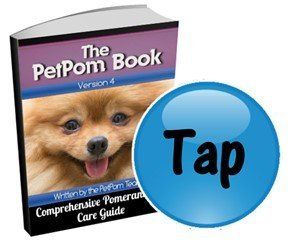Pomeranian Watery, Runny Eyes
Overview
With puppies and dogs, bright shiny eyes are a sign of good health. This means that there will be production of what is known as basal tears. This keeps the eyes moist and works to keep out dust and other fine debris.
When there is overproduction of tears, this will cause a problem in which the Pomeranian has watery eyes.
Small pools of tears will pool in the under eyelids and from there, they will run down over the lower lids and make the facial hairs moist.
This can cause tear staining, which in and of itself is a good reason to diagnose what is causing the water eyes; however there are health conditions that will cause a Pomeranian to have watery eyes so it is important to find the root cause of the problem.
This section will discuss:
- The elements that are in tears
- Reasons why a Pomeranian will have watery eyes in both acute and chronic cases
- Steps you can take to resolve the issue
Please note:
PetPom is reader-supported, and some of the product suggestions on this page are affiliate links. As an Amazon Associate we earn from qualifying purchases. This is at no extra cost to you and helps keep this site running.
What is in Tears
While it may be assumed that tears are just water, there are actually many elements in it. It contains mostly water, but there is also:
- Mucin -a protein based lubricant
- Llipids - This provides a smooth surface over the cornea
- Lipocalin - Functions to transfer the lipids
- Lysozyme - An element that acts as a natural antibiotic
- Lactoferrin -helps protect the eye film; more is secreted during the day and less is produced at night when the dog is sleeping
- Lacritin - Promotes basal tear secretion; this is found in low quantities when a dog has dry eyes and is at a higher level when eyes are watery
- Immunoglobulins - An antibody that helps immunity against disease
- Glucose - A simple sugar molecule
- Urea - A very small waste molecule
- Sodium
- Potassium
How Blinking Affects Tear Production
Eyes are able to stay properly moist due to continue tear production. There is fresh fluid that is held in both the upper and lower lids and in the tear ducts. When the eye blinks, fluid is drawn out over the eye.
Acute Cases of Watery Eyes with a Pomeranian
There is no official length of time in which a medical issue is deemed acute or chronic; depending on the problem it could mean hours, days or even weeks. However, in regard to the issue of watery eyes with a dog, an acute case would be one that clears up on its own within 24 hours.
The most common reason for acute runny eyes is when a small piece of foreign matter has entered the eye(s). The body reacts by overproducing tears in an effort to wash out the offending element. Even if just one eye is affected, the Pomeranian will blink both eyes. Since blinking itself causes extra tear production and combined with the overflow of tears, the eyes can become quite watery.
The most common culprits are tiny pieces of dirt (if the Pomeranian was sniffing around in the grass), any eye lash that has fallen onto the eye or a piece of facial hair.
If you look at your Pom's eye and do see that something is in it, you can flush it out and this usually resolves the issue. Depending on how long the object was on the eye, it may take several hours for the eye to stop reacting to the irritation. Do keep in mind however, that the foreign matter may have caused a cut to the cornea in which case more advanced treatment will be needed.
To flush out a Pomeranian's eyes to treat watery eyes due to irritation, you will want to use a quality canine eye rinse. In emergency cases, you may use a human eye rinse product if you do not have a canine brand on hand; however we do recommend that this is one item to have in your regular grooming
kit.
The best method is to gently pull out the lower lid and place the 2 to 3 drops into the small pocket of the lid. When you let go, the Pomeranian will blink and this will spread the solution over the eyes to rinse out the culprit. Have a small piece of damp sterilize gauze or a small soft washcloth to wipe over they eye area.
If this does not work or if the eye remain watery or if any other signs are presenting, you will then want the veterinarian to have a look. Since the cornea can be injured, it is best to wait no longer than 24 hours.
Testing for Watery Eyes
If an owner is not sure if a Pomeranian's eyes are watery enough to be classified as an issue, a veterinarian should perform a Schirmer tear test to determine if tear production is indeed excessive.
This involves a relatively simple procedure in which a very thin and small piece of special paper is placed in the dog's lower eye lid. This has numbers on it, which measure how much tearing is being produced.
A normal range is 15 to 20 mm/min; though for senior dogs a lower number may be considered to be normal.
Chronic Issues of Watery Eyes with a Pomeranian
There are several possible health conditions that can cause excessive eye discharge.
Allergies
- This is the #1 most common reason why a Pomeranian will have clear, watery eyes. In most cases the runny eye fluid will be clear and watery. If the fluid is thick, forms crust or is colored (yellow, green or brown), that will often point to a different issue; though if the eye area is not routinely wiped with canine facial wipes, the fluid can dry to a red or tan color.
This may be seasonal or food allergies
and much less likely, contact allergies. While most allergies will also cause a Pomeranian to have other symptoms such as itchy skin which will cause a Pomeranian to lick
or chew at areas on the body, sneezing and/or possible thinning hair. In regard to a food intolerance, there may also be vomiting, dry heaving and/or changes to the stools.
Watery eyes from allergies can occur at any age; a dog can grow into this or grow out of it. Also, the triggers can range from grass and weed pollens to dust miles to even flea control products. For this reason, it is best to have a veterinarian to perform an intradermal skin test to try and determine the triggers, which may be more than one.
Blocked tear duct
- This is also a common cause for watery eyes and in many cases the only symptom that a Pomeranian will have is excessive tearing. However in some cases there may also be some irritation around the eye and possibly some redness.
In some cases, this can be treated by a flushing of the ducts and with more severe cases minor surgery may need to be performed.
Corneal injury-
The cornea is the outer layer of eye film that protect it, however it can become scratched surprisingly easily. A Pomeranian may be nosing around outside and a small twig may scratch the eye or can a dog can even get poked by the corner of a blanket.
The only sign may be a runny eye; however in moderate to severe cases there may also be some swelling and the surrounding tissue may turn red. With this, one eye may water more than the other, as the one with the injury will tear more and the other may also have tearing in response to that.
A veterinarian will be able to determine how deep the injury is. With minor scratches, the goal will be to prevent a Pom from touching his eye so that it can heal.
If so, things can resolve within a week or two. Normally an Elizabethan
collar is placed on the dog, but for those that have an aversion to this and simply will not tolerate it, a soft contact lens is another alternative. Antibiotics are also usually prescribed to prevent infection while the eye is vulnerable to it.
Entropion
- This is a genetic condition that causes the eyelid to partially turn inward which in turn will cause the Pomeranian's tiny eyelashes to brush against the eye and cause them to be watery. If this is the case, it is almost always diagnosed by the age of 1 year old. Since dogs are born with this, a Pomeranian over the age of 1 year will not suddenly develop this, though a stray eye lash can always be a possible concern.
This is easily diagnosed with an eye examination and the vet will check for any possible ulcerated corneas that may have developed. Very minor cases are treated with antibiotic eye drops and most moderate and certainly severe cases are corrected via surgery.
Conjunctivitis - Watery eyes with a Pomeranian can be due to either viral conjunctivitis or allergic conjunctivitis. Typical signs include redness and puffy eyelids.
The discharge will not be a clear watery fluid. It will be thick and with most dogs, it will dry to a sticky crust overnight that can actually cause the eyes to be stuck closed with the dog wakes up from
sleeping. You may also notice that the discharge is stringy and stretchy when you try to wipe it away.
Allergic conjunctivitis may be caused by an allergy to dust mites, seasonal triggers such as pollen, and even environmental factors such as perfumes and cleaning products. Treatment includes Antihistamines, eye drops that contain steroids to reduce swelling and cold compresses.
If a Pomeranian has viral conjunctivitis, it should be noted that this is very contagious and both other pets and humans can catch this. Along with this, a dog may also have a cold, throat infection or a lung infection.
Treatment will vary according to whether or not there are these other issues; however basic care will include steroid eye drops, possibly antibiotic drops and cold compresses. Most dogs recover in 3 weeks. During this time, be sure to thoroughly wash your hands any time after touching your Pomeranian and especially after cleaning and taking care of his eyes.
Glaucoma
- This is rather rare however still something to be considered. This is a condition in which there is too much pressure in the eye.
It is important to have this ruled out since it can lead to nerve damage that results in permanent blindness.
Symptoms of this will include water eyes, excessive blinking, a rolling of the eyeball inward to the head, bloodshot eyes, a cloudy film and/or problems with vision. Some dogs that have this will also have a marked decrease in appetite and have less enthusiasm to play or interact as they may also suffer from bad headaches.
Most vets will refer an owner to bring their Pomeranian to a veterinary ophthalmologist who will make a diagnosis. There are several medications that can slow down or even stop the progression of this.
Infection or other illness
- In some cases, a lung infection or other health problem
can cause a runny nose, runny eyes or both. This will be checked for as well, regardless of other symptoms if no other cause can be found.
Watery Eye Prevention
Since a slight scratch to the eye and small debris in the eyes are two common causes for runny eyes, there are some things that you can do to try and prevent issues. In addition, proper care will help prevent other issues such as tear staining.
1)
You should routinely clean your Pom's face and eye area to wipe away any possible tiny pieces of debris that could potential travel to the eyes including little bits of food. When wiping the lids, do this in a downward motion, so that the lids are gently closed as they are being cleaned.
Be sure to use a quality canine facial wipe like Earthbath Specialty Eye Wipes . And if your Pomeranian is prone to staining, you'll want to use daily wipes in conjunction with a tear stain removing
product.
. And if your Pomeranian is prone to staining, you'll want to use daily wipes in conjunction with a tear stain removing
product.
2)
Many dogs suffer eye injury due to running through gardens or areas of high grass. Since there are other dangers as well including ticks and insect bites (and even snakes), it is best to keep your Pomeranian's adventures to short grassy areas.
3)
Keep a quality canine eye cleanser on hand as part of your grooming kit so that if something does enter the eye and is causing irritation and watering, you can immediately treat this at home.
4)
Even for minor runny eye issues, keep a close watch on things. Bring your Pomeranian to the vet if it does not clear up after 24 hours or if there are any additional symptoms.



